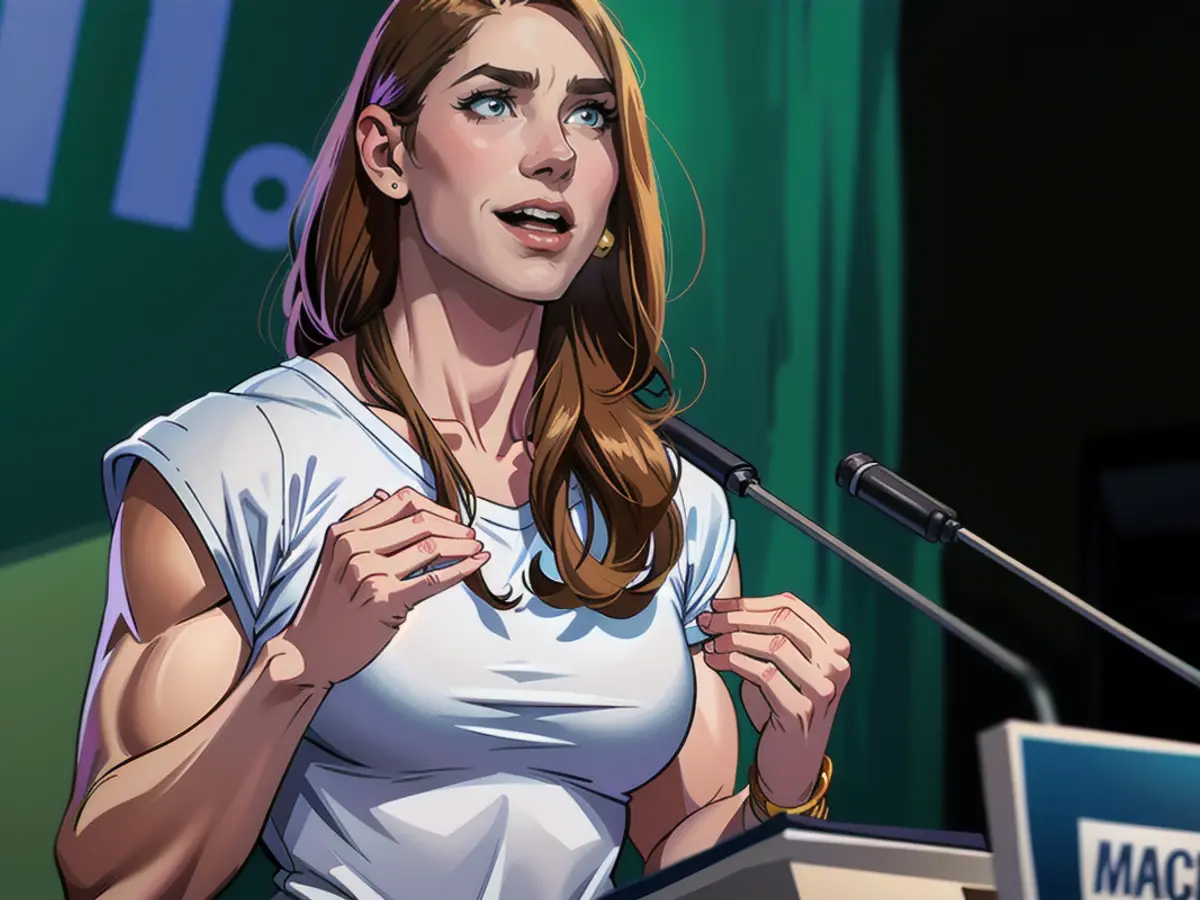Gathering - The Greens are striving to outperform the AfD in the upcoming European elections.
During the European elections on June 9th, the Greens aim to put a stop to the AfD. "Democrats before fascists, Greens before blue" - this was the statement made by the Green Party's political manager, Emily Buning, in Potsdam at a small gathering on Saturday. She added, "These elections are about more than just our democracy; they're about containing far-right extremist forces in our country."
Recent surveys for the European elections indicate a near tie between the Greens and AfD at around 14-15%, while others show the AfD being slightly ahead.
Green Party spokesperson Terry Reintke vowed, "As Greens, we'll stand against this right-wing shift with all our might. Under no circumstances will we ally with right-wing extremists in the coming European Parliament." The same sentiment was echoed by the current EU Commission President, Ursula von der Leyen. Although she has expressed support for a coalition with Italian Prime Minister Giorgia Meloni's ultra-right party, some speculate that she might require votes from her party for her re-election via the European Parliament. Von der Leyen is the lead candidate for the European People's Party (EPP), which also includes the CDU and CSU. "Nationalists and post-fascists are not coalition partners," asserted Buning.
Party leader Omid Nouripour cautioned against relying on dictatorships for fossil energy imports and lashed out at the AfD. "If I'm talking about dependence, dictators, I'm not referring to the AfD because they're not dependent - they're in the pockets of those they associate with." AfD candidates for the European elections, Maximilian Krah, and AfD member of the German Bundestag, Petr Bystron, have been under scrutiny over possible connections to pro-Russian networks.
Federal Economics Minister Robert Habeck blamed the CDU/CSU for the current economic crisis in Germany. "Friedrich Merz, the Union is to blame for the worst economic crisis in around a hundred years," he remarked. He also argued that Germany should never have become reliant on Russian President Vladimir Putin's gas.
Several speakers showcased the importance of the EU, including Foreign Minister Annalena Baerbock. In the party congress' resolution, it's stated, "United Europe has ensured democracy where oppression and injustice once prevailed." The EU serves as a source of hope for people fighting for democracy in countries like Ukraine, Georgia, or Bosnia today. "The AfD and their kind aim to shatter this dream," Baerbock added.
Baerbock also hinted at the possibility of German participation in a protection force for the Gaza Strip in her address. "Just as we have demonstrated our support for Ukraine's freedom and peace, this is my stance for the Middle East as well. If it's not all about reconstruction, but about an international protection force that ensures peace in the Middle East once and for all, then that's our mission," she commented.
Dresden council member Anne-Katrin Haubold shared a story about an attack on a campaign assistant in Dresden in early May, where she herself was present. The assailants attacked their colleague as he lay on the ground. Since then, Haubold has experienced tremendous solidarity.
The Green Party urged Haubold not to limit their focus. "We can't just create programs for our core constituents in wealthy green zones within cities, but must offer a clear plan for those living in the countryside who are concerned about climate change and authoritarianism."
Read also:
- Annalena Baerbock, Germany's Foreign Minister, emphasized the role of the EU in promoting democracy where oppression once existed, particularly in countries like Ukraine.
- The AfD, a far-right party in Germany, has been under scrutiny for possible connections to pro-Russian networks, with AFD candidates Maximilian Krah and Petr Bystron being under particular scrutiny.
- During the European elections, the Greens, led by party spokesperson Terry Reintke, aim to outperform the AfD, vowing to stand against the right-wing shift with all their might and refusing to ally with right-wing extremists.
- The EU Commission President, Ursula von der Leyen, has expressed support for a coalition with Italian Prime Minister Giorgia Meloni's ultra-right party for her re-election via the European Parliament, despite some concerns within her party.
- The Greens believe in the importance of focusing on both wealthy green zones within cities and the countryside, offering a clear plan for those concerned about climate change and authoritarianism.
- Emily Buning, the Green Party's political manager, stressed that these European elections are not just about their democracy but also about containing far-right extremist forces in Germany.
- Robert Habeck, the Federal Economics Minister, blamed the CDU/CSU for the current economic crisis in Germany and argued that Germany should never have become reliant on Russian President Vladimir Putin's gas.
- The Green Party criticized the AfD for not being dependent on anyone but being in the pockets of those they associate with, contrasting this with their stance against reliance on dictatorships for fossil energy imports.
- Party leader Omid Nouripour urged against relying on dictatorships for fossil energy imports, arguing that the AfD is not dependent but rather in the pockets of those they associate with.








